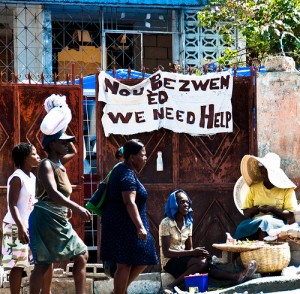Whatever Happened To Millions In Aid To Haiti?
 Port-au-Prince, Haiti — Written on the walls of Haiti’s dilapidated palace in crimson-red graffiti, are the words “No president, no government.” A people who have proven the utmost resilience after a natural disaster have also proven contempt for the political responses (or lack, thereof) to their plight. After the tumultuous earthquake last January, the international community pledged billions of dollars, promising to bring Haiti out of the rubble and into a complete rebuild. In March 2010, the United Nations declared Haiti was to receive $5.3 billion U.S. dollars in pledges over two years, and $9.9 billion dollars over ten years.
Port-au-Prince, Haiti — Written on the walls of Haiti’s dilapidated palace in crimson-red graffiti, are the words “No president, no government.” A people who have proven the utmost resilience after a natural disaster have also proven contempt for the political responses (or lack, thereof) to their plight. After the tumultuous earthquake last January, the international community pledged billions of dollars, promising to bring Haiti out of the rubble and into a complete rebuild. In March 2010, the United Nations declared Haiti was to receive $5.3 billion U.S. dollars in pledges over two years, and $9.9 billion dollars over ten years.
Over a year later, Haiti has received only 63% of aid money pledged. The country has been plagued with a cholera epidemic that has thus far killed 5,200 people. The country has between 2.5 and 3.3 million food insecure. More than a million Haitians are still living in displacement camps. One reason seems to be that organizations are running out of money; of the $951 million pledged in 2011, Haiti has only received $157 million.
But why?
With newly inaugurated President and former pop star, Michel Martelly assuming political power, former Haitian President Aristide returning from exile, and the Haiti Reconstruction Fund slowly stammering to make progress on Haiti’s rebuild, it is crucial to understand now why the effort to rebuilt Haiti has stalled and what needs to be done to fix it.
Not only is the international community struggling to collect all its pledges, it has focused the aid on emergent needs and not long-term rebuilding efforts. For example, while food has sporadically been sent to feed the homeless, the country’s destroyed agricultural system has yet to be addressed. While it has provided tarps for over 250,000 families, there aren’t sturdier shelters being built for the 1,300 displacement camps. And while thousands of non-profits and volunteers have deployed to help, these actors are young, inexperienced, and untrained. As Ricardo Seitenfus, representative of the Organization of American States in Haiti told the Swiss Daily le Temps:
Haiti, I can tell you, is not suitable for amateurs. Since January 12, because of massive recruitment, professional quality has declined considerably. There is a maleficent or a perverse relation between the NGOs and the weakness of the Haitian state.
Now, many of these NGOs are packing up and leaving. Some current moves include the World Bank’s efforts to analyze the safety of 400,000 houses to send displaced families back home. And the announcement in May that the Clinton Bush Haiti Fund would invest $2 million to finish construction on the 130-room Oasis Hotel, creating jobs for 600 workers and inviting businesses and foreigners to travel to Port-au-Prince.
Nonetheless, still only 38% of this aid has been spent.
Issues of governance, specifically how the Haitian government responded to the crisis, have also affected aid spending. Government officials and the public alike were hopeful, though, that a newly elected leader would jump-start the rebuilding process. But even though new president “Sweet Micky” promised a new Haiti on May 14, not many trust his words. After all, only 16% of the country voted him into office. Some fear that he will only bring Haiti back to a repressive military state. And others worry that he merely serves as a political pawn for the U.S. to control.
Haiti is at a crossroads of chaos, where the actors who strive to help are plentiful, but where still millions are without basic means to survive. And unfortunately, this crossroads has turned into a dramatic blame game that has not yet seen a victor. In fact, its losers are only the hundreds of thousands still at the mercy of donor apathy, unfinished plans, and political instability.
Haiti has suffered enough at the hands of various non-profits solving temporary problems but creating others. Haitians have gotten their hopes up only to be crushed by promises of revival without practical delivery. So let us follow through on our monetary promises, but above all else, let us, with respect for those Haitians still living in squalor, hold our international and Haitian leaders accountable for turning those rebuilding promises into realities.
Follow Nicole Kreisberg on Twitter at @NicoKrei
[Photo By Lee Cohen]
